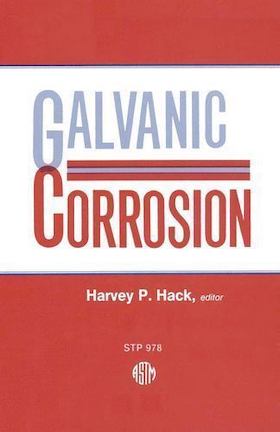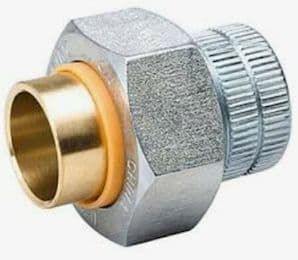
Curated with aloha by
Ted Mooney, P.E. RET

The authoritative public forum
for Metal Finishing 1989-2025

-----
ELECTROLYTIC ACTION IN PIPING
WE'VE BEEN CALLED TO RESOLVE A PROBLEM WITH A CUSTOMERS HOT WATER RING MAIN, THE PIPE WORK IS GALVANIZED STEEL AND IS DEVELOPING PIN HOLE LEAKS. I THINK THIS MAY BE CAUSED BY AN ELECTROLYTIC ACTION GENERATED BY THE SUPPLY PIPE WORK FROM THE BOILERS WHICH IS COPPER AND SCREW DIRECTLY TO THE GALVANIZED STEEL.
IF I AM CORRECT IS THERE ANY THING THAT CAN BE DONE AS PREVENTION, WITHOUT REMOVING AND REPLACING WITH STEEL, A CONSIDERABLE AMOUNT OF COPPER TUBE.
- GLASTONBURY SOMERSET ENGLAND
2003
Galvanic corrosion requires two current paths: an ionic path (through the water) and a metallic path (through the pipe). If you can install a dielectric union where the copper pipe presently joins the steel pipe you will no longer have the metallic path required to sustain galvanic corrosion.

Ted Mooney, P.E.
Striving to live Aloha
finishing.com - Pine Beach, New Jersey
2003
Both you and Ted are right - you have a classic galvanic couple between the steel and the copper. The copper will be cathodic to the steel, so the steel will be attacked, irrespective of the galvanized coating. However, I would expect the attack to be quite close to the coupling. The simplest way to stop this is to put an insulating joint between the copper and steel. If it is a long way from the coupling, it could be due to other problems. For instance, if the pinholes are on the outside of a bend, it could be erosion corrosion caused by particles in the water eroding the inside of the pipe as they go round the bend. It could also be due to the outside of the galvanised steel pipe being attacked by another chemical, or even dripping water.

Trevor Crichton
R&D practical scientist
Chesham, Bucks, UK
2003
If there are no apparent leaks or blockages in water supply plumbing of an older home, do you recommend proactively replacing all non-dielectric union transitions between copper and galvanized steel? Or is it more cost-effective to observe closely and repair as leaks and/or corrosion become apparent? Thanks.
Nancy Becker- St. Louis, Missouri
2004
I don't think it would be cost effective to retrofit dielectric unions unless a problem is obvious or historical. As the son of a plumbing contractor, and a one-time plumber's helper, I know that there are millions of non-galvanically protected dissimilar metal joints in homes. Further, electricians, telephone installers, and cable TV techs will casually ground their equipment to pipe that may no longer actually be grounded if dielectric unions are installed, so that may need to be redone as well. And who knows what went on behind the walls.
However, galvanic corrosion can be a serious issue, and preventing it from the start is inexpensive since dielectric unions don't cost much more than regular unions. For an illustration, look at page 84 of
"Plumbing: Basic, Intermediate & Advanced Projects" (Amazon lets you sneak a peek inside this book). Many plumbing codes now require dielectric unions.

Ted Mooney, P.E.
Striving to live Aloha
finishing.com - Pine Beach, New Jersey
2004
I would like to know, If a plumber repairs a leaking pipe and joins copper to galvanised piping should he earth the pipe to prevent this electrolytic action from occurring. It is my understanding that no current can be created unless there are two different metals involved, is this correct?
William Pringle- South Africa
2004
To my knowledge grounding is done for other reasons, not to stop electrolytic action. The way to stop electrolytic action is to break the metal-to-dissimilar-metal path with dielectric unions or equivalent.

Ted Mooney, P.E.
Striving to live Aloha
finishing.com - Pine Beach, New Jersey
2004
I'm selling a house which has some copper to steel joints. The buyer wants these joints fixed as part of the terms of the sale. I need to figure out what kind of costs (Ballpark) I'm looking at to fix these joints. Am I looking at under 1,000 or a lot more to have a plumber come in and add a dielectric nipple or use a plastic adaptor fitting in between to avoid the galvanic corrosion?
Brett Payer- Portland, Oregon
2005
Depending on how many instances there are, I would expect it to cost less than $1000. Then again, I'm always shocked by plumbers' and auto mechanics' bills :-)

Ted Mooney, P.E.
Striving to live Aloha
finishing.com - Pine Beach, New Jersey
2005
you need to place a magnesium rod into the bottom of the copper cylinder to act as a sacrificial anode
dale evans- manchester england
2006
2006
Galvanic reaction will only occur with circulating water, and not a dead leg.
For example, if you connect a tub in copper direct from a galvanised hot water line, without a return line, you will not have a problem.
thescruff
- Bath, England
Thank you for your posting, David, but I can't agree with it. Galvanic corrosion occurs in all manner of situations and the requirements are 1). dissimilar metals (to provide the voltage), 2). a metallic path (two metals connected without insulation to carry current), and 3). an ionic path (usually water, more of a problem with salt water). Galvanic corrosion can occur outside with pipe railings that (obviously) don't even have water in them -- but just dew and rain on them.

Ted Mooney, P.E.
Striving to live Aloha
finishing.com - Pine Beach, New Jersey
2006
One often overlooked problem with dielectric fittings is that the piping is often electrically bonded elsewhere in the building. This then provides the electron path and negates the usefulness of the fitting.
Tom Gibb- Baltimore, Maryland, USA
2007
2007
The OP is talking about dissimilar metals in a water system.
Galvanic reaction will not occur on a dead leg.
What is never considered when faced with corrosion problems, is residual currents and that will eat copper and steel.
- Bath, England
I have a similar problem in a 3-story building. All of the hot water flow and secondary return pipe work in the false ceiling is pin holing. The copper pipe work is earth bonded as well as the ceiling track. As the pipe work comes up through the boiler room, this pipe work turns from (lcs) iron to copper. This problem is only on the 1st floor. the 1st floor also suffers from static electricity, I get static shocks from the ceiling track as well as the copper pipe work. Would I be right in saying that the static electricity is intensifying the electrolytic action? If so Would you be kind enough to let me know how to stop this from eating the copper pipe. there is approx. 2000 meters of pipe affected. thanks
- southampton, hampshire, england
January 5, 2011
Q, A, or Comment on THIS thread -or- Start a NEW Thread

